Dear Zazie,
Here is today’s Lovers’ Chronicle from Mac Tag.
Rhett
The Lovers’ Chronicle
Dear Muse,
a thousand miles away
and yet close enough,
i can feel the wind
there are things
that words fail
the 40 mile vistas
a night sky
horizon to horizon
full of stars
the look in your eyes
when you say, yes
whispers in the dark
a connection
that feels as though
it has always been
© copyright 2020 mac tag/cowboy coleridge all rights reserved
tonight we dream of that place where worry of the world holds not, a placid ecstasy, and ease of bein’, where we know what is real and free of will, and the pleasure lies in this, here with the long splendid views, and the wind, and feelin’s which we have never seen or heard of
© copyright 2019 mac tag/cowboy coleridge all rights reserved
let me take you
to the Seven Cross
on the Texas High Plains
a world of isolation
far from the nearest town
where i will show you,
in abundance;
wind and wildlife,
old friendships,
wide open vistas,
night skies with more stars
than you can imagine
and the end of our search
© copyright 2018 mac tag/cowboy coleridge all rights reserved
might be hard to find
but once you do
you might just
find yourself
go west, on the two lane black top
turn south on an old county road,
then east on the caliche road
and you will find, The Seven Cross
© copyright 2017 mac tag/cowboy Coleridge all rights reserved
Today is the birthday of John Ford (Ilsington, Devon, England 1586 – ca. 1639); English playwright and poet of the Jacobean and Caroline eras. Perhaps best known for the tragedy ‘Tis Pity She’s a Whore (1633), a family drama with a plot line of incest. The play’s title has often been changed in new productions, sometimes being referred to as simply Giovanni and Annabella — the play’s leading, incestuous brother-and-sister characters. In a nineteenth-century work it is coyly called The Brother and Sister. Shocking as the play is, it is regarded as a classic piece of English drama. It has been adapted to film at least twice: My Sister, My Love (Sweden, 1966) and ‘Tis Pity She’s a Whore (Belgium, 1978).
The Lover’s Melancholy (1628)
- Flattery
Is monstrous in a true friend.- Act I, sc. i.
- Tell us, pray, what devil
This melancholy is, which can transform
Men into monsters.- Act III, sc. i.
- Melancholy
Is not, as you conceive, indisposition
Of body, but the mind’s disease.- Act III, sc. i.
- Philosophers dwell in the moon.
- Act III, sc. iii.
- Love is the tyrant of the heart; it darkens
Reason, confounds discretion; deaf to Counsel
It runs a headlong course to desperate madness.- Act III, sc. iii.
- Fly hence, shadows, that do keep,
Watchful sorrows, charmed in sleep.- Act V, sc. i.
Love is dead; let lovers’ eyes
Locked in endless dreams
Th’ extreme of all extremes
Ope no more, for now Love dies.
Today is the birthday of Henry Vaughan (Newton St. Bridget, Wales 17 April 1621 – 23 April 1695 Scethrog House, Wales); author, physician and metaphysical poet. Perhaps best known for his religious poetry contained in Silex Scintillans, which was published in 1650, with a second part published in 1655.
Dear Night! this world’s defeat;
The stop to busy fools; care’s check and curb;
The day of spirits; my soul’s calm retreat
Which none disturb!
They are all gone into the world of light!
And I alone sit lingering here;
Their very memory is fair and bright,
And my sad thoughts doth clear.
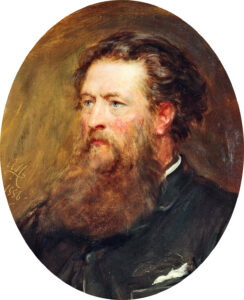
Portrait by Sir Arthur Stockdale Cope KCVO RA
Aberdeen Art Gallery & Museums Collections
Today is the birthday of George Vicat Cole RA (Portsmouth, Hampshire, England; April 1833 – 6 April 1893); painter.
Cole was the son of the landscape painter, George Cole (1810–1883), and in his practice followed his father’s lead with marked success. He exhibited at the British Institution at the age of nineteen, and was first represented at the Royal Academy in 1853. His election as an associate of this institution took place in 1870, and he became an Academician ten years later. He died in London on 6 April 1893. The wide popularity of his work was due partly to the simple directness of his technical method, and partly to his habitual choice of attractive material.
Most of his subjects were found in the counties of Surrey and Sussex, and along the banks of the Thames. One of his largest pictures, The Pool of London, was bought by the Chantrey Fund Trustees in 1888, and was shown in the Tate Gallery.
He was the father of the painter Rex Vicat Cole.
His daughter Mary Blanche Cole (1858–1945), also an artist, married the artist Louis Paul (Alexander Louis Paul 1855–1927).
Gallery
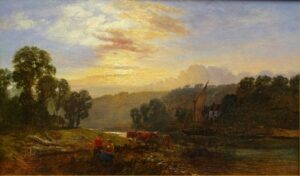
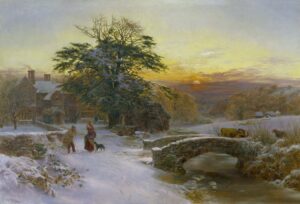
Winter scene with cattle and figures 1865
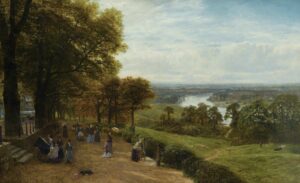
Richmond Hill, London by 1876
Oil on Canvas
Today is the birthday of Baroness Karen von Blixen-Finecke (Rungsted, Denmark 17 April 1885 – 7 September 1962 Rungsted), née Karen Christenze Dinesen; author, also known by the pen name Isak Dinesen, who wrote works in Danish, French and English. She also at times used the pen names Tania Blixen, Osceola, and Pierre Andrézel. Perhaps best known for Out of Africa, an account of her life while living in Kenya, and for one of her stories, Babette’s Feast, both of which have been adapted into Academy Award-winning motion pictures.
| Karen Blixen | |
|---|---|
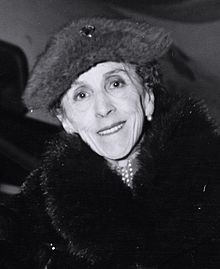
Blixen in 1957
|
|

Dinesen first fell in love with the equestrian Hans von Blixen-Finecke but he did not reciprocate. She therefore decided to accept the favours of his twin brother, Baron Bror Blixen-Finecke, announcing their engagement on 23 December 1912. Given the difficulties both were experiencing in settling in Denmark, the family suggested they should move abroad. Their common uncle, Aage Westenholz (1859–1935) who had made a fortune in Siam, suggested they should go to Kenya to start a coffee farm. Early in 1913, Bror Blixen-Finecke left for Kenya, followed by Dinesen in December.
Soon after Dinesen arrived in Kenya, which at the time was part of British East Africa, she and Blixen married in Mombassa on January 14, 1914. After her marriage, she was known as Baroness Blixen, and used the title until 1929, when her ex-spouse remarried. Initially, they planned to raise cattle on their farm, but were convinced that coffee would be more profitable. The couple soon established their first farm, M’Bagathi, in the Great Lakes area, but quickly ran into difficulties caused by the outbreak of the First World War. Fighting between the Germans and British in East Africa led to a shortage of workers and supplies. Nevertheless, in 1916, the Karen Coffee Company purchased a larger farm, M’Bogani, near the Ngong Hills to the north of Nairobi. It covered 6,000 acres of land, of which 600 were used for a coffee plantation. The remainder were used by the natives for grazing while 2,000 acres of virgin forest were left untouched.
However, the land was not suited for coffee cultivation, being too high in elevation. The couple hired local workers, predominantly the Kikuyu people who lived on the farmlands at the time of their arrival but there were also Wakamba, Kavirondo, Swahili and Masai. Initially Bror Blixen-Finecke worked the farm, but it soon became evident that he had little interest in it and preferred to leave running the farm to Blixen while he went on safari. For the first time, English became the language she used daily. About the couple’s early life in the African Great Lakes region, Karen Blixen later wrote,
Here at long last one was in a position not to give a damn for all conventions, here was a new kind of freedom which until then one had only found in dreams!
Blixen and her husband were quite different in education and temperament, and Bror Blixen was unfaithful to his wife. She was diagnosed with syphilis toward the end of their first year of marriage in 1915. She returned to Denmark in June 1915 for treatment which proved successful. Although Blixen’s illness was eventually cured (some uncertainty exists), it created medical anguish for years to come. By 1919, the marriage had run into serious difficulties, causing her husband to request a divorce in 1920. Against her wishes, the couple separated in 1921, and were officially divorced in 1925. Bror Blixen was dismissed as the farm manager by Aage Westenholz, chair of the Karen Coffee Company, and Karen Blixen took over its management officially in 1921.

In 1918, Blixen met the English big game hunter Denys Finch Hatton (1887–1931), an English army officer and aristocrat. He often travelled back and forth between Africa and England and would visit her occasionally. After her separation from her husband she and Finch Hatton developed a close friendship which eventually became a long-term love affair. In a letter to her brother Thomas in 1924, she wrote: “I believe that for all time and eternity I am bound to Denys, to love the ground he walks upon, to be happy beyond words when he is here, and to suffer worse than death many times when he leaves…” But other letters in her collections show that the relationship was unstable, and that Blixen’s increasingly dependent behavior upon Finch Hatton, who was intensely independent, was an issue.
Finch Hatton used Blixen’s farmhouse as a home base between 1926 and 1931, when on safari with his clients. He died in the crash of his de Havilland Gipsy Moth biplane in March 1931. At the same time, the failure of the coffee plantation, as a result of mismanagement, a drought and the falling price of coffee caused by the worldwide economic depression, forced Blixen to abandon her beloved estate. The family corporation sold the land to a residential developer, and Blixen returned Denmark in August 1931 to live with her mother. She remained in Rungstedlund for the rest of her life.

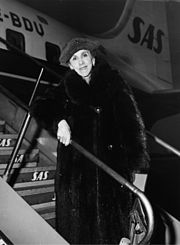
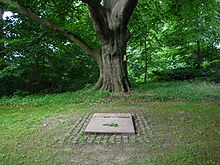

Out of Africa (1937)
I had a farm in Africa, at the foot of the Ngong Hills. The Equator runs across these highlands, a hundred miles to the North, and the farm lay at an altitude of over six thousand feet. In the day-time you felt that you had got high up, near to the sun, but the early mornings and evenings were limpid and restful, and the nights were cold.
People who dream when they sleep at night know of a special kind of happiness which the world of the day holds not, a placid ecstasy, and ease of heart, that are like honey on the tongue. They also know that the real glory of dreams lies in their atmosphere of unlimited freedom. It is not the freedom of the dictator, who enforces his own will on the world, but the freedom of the artist, who has no will, who is free of will. The pleasure of the true dreamer does not lie in the substance of the dream, but in this: that there things happen without any interference from his side, and altogether outside his control. Great landscapes create themselves, long splendid views, rich and delicate colours, roads, houses, which he has never seen or heard of…
Seven Gothic Tales (1934)
- “Do you know a cure for me?”
“Why yes,” he said, “I know a cure for everything. Salt water.”
“Salt water?” I asked him.
“Yes,” he said, “in one way or the other. Sweat, or tears, or the salt sea.”- “The Deluge at Norderney”
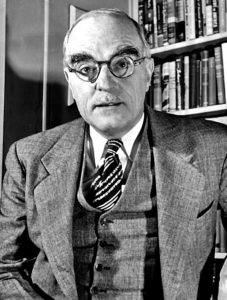 And today is the birthday of Thornton Wilder (born Thornton Niven Wilder; Madison, Wisconsin; April 17, 1897 – December 7, 1975 Hamden, Connecticut); playwright and novelist. He won three Pulitzer Prizes—for the novel The Bridge of San Luis Rey, and for the plays Our Town and The Skin of Our Teeth — and a U.S. National Book Award for the novel The Eighth Day.
And today is the birthday of Thornton Wilder (born Thornton Niven Wilder; Madison, Wisconsin; April 17, 1897 – December 7, 1975 Hamden, Connecticut); playwright and novelist. He won three Pulitzer Prizes—for the novel The Bridge of San Luis Rey, and for the plays Our Town and The Skin of Our Teeth — and a U.S. National Book Award for the novel The Eighth Day.
Wilder never married and kept his personal life private.
Quotes
- Love is an energy which exists of itself. It is its own value.
- TIME magazine (3 February 1958)
- Many who have spent a lifetime in it can tell us less of love than the child that lost a dog yesterday.
- As quoted in “The Notation of the Heart” by Edmund Fuller, in The American Scholar Reader (1960) edited by Hiram Hayden and Betsy Saunders
- Love, though it expends itself in generosity and thoughtfulness, though it gives birth to visions and to great poetry, remains among the sharpest expressions of self-interest. Not until it has passed through a long servitude, through its own self-hatred, through mockery, through great doubts, can it take its place among the loyalties.
- As quoted in “The Notation of the Heart” by Edmund Fuller, in The American Scholar Reader (1960) edited by Hiram Hayden and Betsy Saunders
The Bridge of San Luis Rey (1927)
- Like all the rich he could not bring himself to believe that the poor (look at their houses, look at their clothes!) could really suffer. Like all the cultivated he believed that only the widely read could be said to know that they were unhappy.
- Soon we shall die and all memory of those five will have left earth, and we ourselves shall be loved for a while and forgotten. But the love will have been enough; all those impulses of love return to the love that made them. Even memory is not necessary for love. There is a land of the living and a land of the dead and the bridge is love, the only survival, the only meaning.
- Style is but the faintly contemptible vessel in which the bitter liquid is recommended to the world.
- Now he discovered that secret from which one never quite recovers, that even in the most perfect love one person loves less profoundly than the other.
Our Town (1938)
- People are meant to go through life two by two. ‘Tain’t natural to be lonesome.
- “Mrs. Gibbs”
- A man looks pretty small at a wedding, George. All those good women standing shoulder to shoulder, making sure that the knot’s tied in a mighty public way.
- “Mr. Webb”
- Wherever you come near the human race there’s layers and layers of nonsense.
- “Stage Manager”
- That’s what it was to be alive. To move about in a cloud of ignorance; to go up and down trampling on the feelings of those… of those about you. To spend and waste time as though you had a million years. To be always at the mercy of one self-centered passion, or another. Now you know — that’s the happy existence you wanted to go back to. Ignorance and blindness.
- “Simon Stimson”
- I can’t. I can’t go on. It goes so fast. We don’t have time to look at one another. I didn’t realize. So all that was going on and we never noticed. Take me back — up the hill — to my grave. But first: Wait! One more look. Good-by, Good-by, world. Good-by Grover’s Corners…Mama and Papa. Good-by to clocks ticking…and Mama’s sunflowers. And food and coffee. And new ironed dresses and hot baths…and sleeping and waking up. Oh, earth, you’re too wonderful for anybody to realize you. …Do human beings ever realize life while they live it? — Every, every minute? …I’m ready to go back…I should have listened to you. That’s all human beings are! Just blind people.
- “Emily Webb”
The Skin of Our Teeth (1942)[edit]
- I’ve never forgotten for long at a time that living is struggle. I know that every good and excellent thing in the world stands moment by moment on the razor-edge of danger and must be fought for — whether it’s a field, or a home, or a country.
- Antrobus, in Act 3
- My advice to you is not to inquire why or whither, but just enjoy your ice cream while it’s on your plate — that’s my philosophy.
- Sabina, Act One
- I hate this play and every word in it.
- Sabina
The Matchmaker (1954)
- Later adapted into the musical Hello, Dolly
- Marriage is a bribe to make a housekeeper think she’s a householder.
- Vandergelder, in Act 1
- Never support two weaknesses at the same time. It’s your combination sinners — your lecherous liars and your miserly drunkards — who dishonor the vices and bring them into bad repute.
- Malachi, in Act 3
- Nurse one vice in your bosom. Give it the attention it deserves and let your virtues spring up modestly around it. Then you’ll have the miser who’s no liar; and the drunkard who’s the benefactor of the whole city.
- Malachi, in Act 3
- The test of an adventure is that when you’re in the middle of it, you say to yourself, “Oh, now I’ve got myself into an awful mess; I wish I were sitting quietly at home.” And the sign that something’s wrong with you is when you sit quietly at home wishing you were out having lots of adventure.
- Barnaby, in Act 4
- Money is like manure; it’s not worth a thing unless it’s spread around encouraging young things to grow.
- Dolly Levi, in Act 4
- The difference between a little money and no money at all is enormous…and the difference between a little money and an enormous amount of money is very slight.
- Ninety-nine per cent of the people in the world are fools and the rest of us are in great danger of contagion.
Writers at Work interview (1958)
- The future author is one who discovers that language, the exploration and manipulation of the resources of language, will serve him in winning through to his way.
- I think myself as a fabulist, not a critic. I realize that every writer is necessarily a critic — that is, each sentence is a skeleton accompanied by enormous activity of rejection; and each selection is governed by general principles concerning truth, force, beauty, and so on. But, as I have just suggested, I believe that the practice of writing consists in more and more relegating all that schematic operation to the subconscious. The critic that is in every fabulist is like the iceberg — nine-tenths of him is underwater.
- The comic spirit is given to us in order that we may analyze, weigh, and clarify things in us which nettle us, or which we are outgrowing, or trying to reshape.
- On the stage it is always now; the personages are standing on that razor edge, between the past and the future, which is the essential character of conscious being; the words are rising to their lips in immediate spontaneity … The theater is supremely fitted to say: “Behold! These things are.”
- Many great writers have been extraordinarily awkward in daily exchange, but the greatest give the impression that their style was nursed by the closest attention to colloquial speech.
- A dramatist is one who believes that the pure event, an action involving human beings, is more arresting than any comment that can be made upon it.
- The theatre is supremely fitted to say: “Behold! These things are.” Yet most dramatists employ it to say: “This moral truth can be learned from beholding this action.”
- I am convinced that, except in a few extraordinary cases, one form or another of an unhappy childhood is essential to the formation of exceptional gifts.
- One of the dangers of the American artist is that he finds himself almost exclusively thrown in with persons more or less in the arts. He lives among them, eats among them, quarrels with them, marries them.
The Eighth Day (1967)
- It is only in appearance that time is a river. It is rather a vast landscape and it is the eye of the beholder that moves.
- Those who are silent, self-effacing and attentive become the recipients of confidences.
- Hope, like faith, is nothing if it is not courageous; it is nothing if it is not ridiculous.
- A sense of humor judges one’s actions and the actions of others from a wider reference and a longer view and finds them incongruous. It dampens enthusiasm; it mocks hope; it pardons shortcomings; it consoles failure. It recommends moderation.
- We do not choose the day of our birth nor may we choose the day of our death, yet choice is the sovereign faculty of the mind.
- Man is not an end but a beginning. We are at the beginning of the second week. We are children of the eighth day.
- The planting of trees is the least self-centered of all that we do. It is a purer act of faith than the procreation of children.
- When God loves a creature he wants the creature to know the highest happiness and the deepest misery … He wants him to know all that being alive can bring. That is his best gift…. There is no happiness save in understanding the whole.
Theophilus North (1973)
- Imagination draws on memory. Memory and imagination combined can stage a Servants’ Ball or even write a book, if that’s what they want to do.
Mac Tag

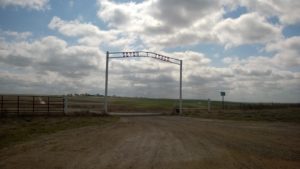

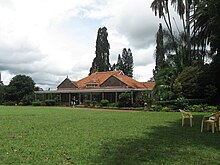
No Comments on "The Lovers’ Chronicle 17 April – seven cross – verse by John Ford & Henry Vaughan – art by George Vicat Cole – birth of Karen Blixen & Thornton Wilder"